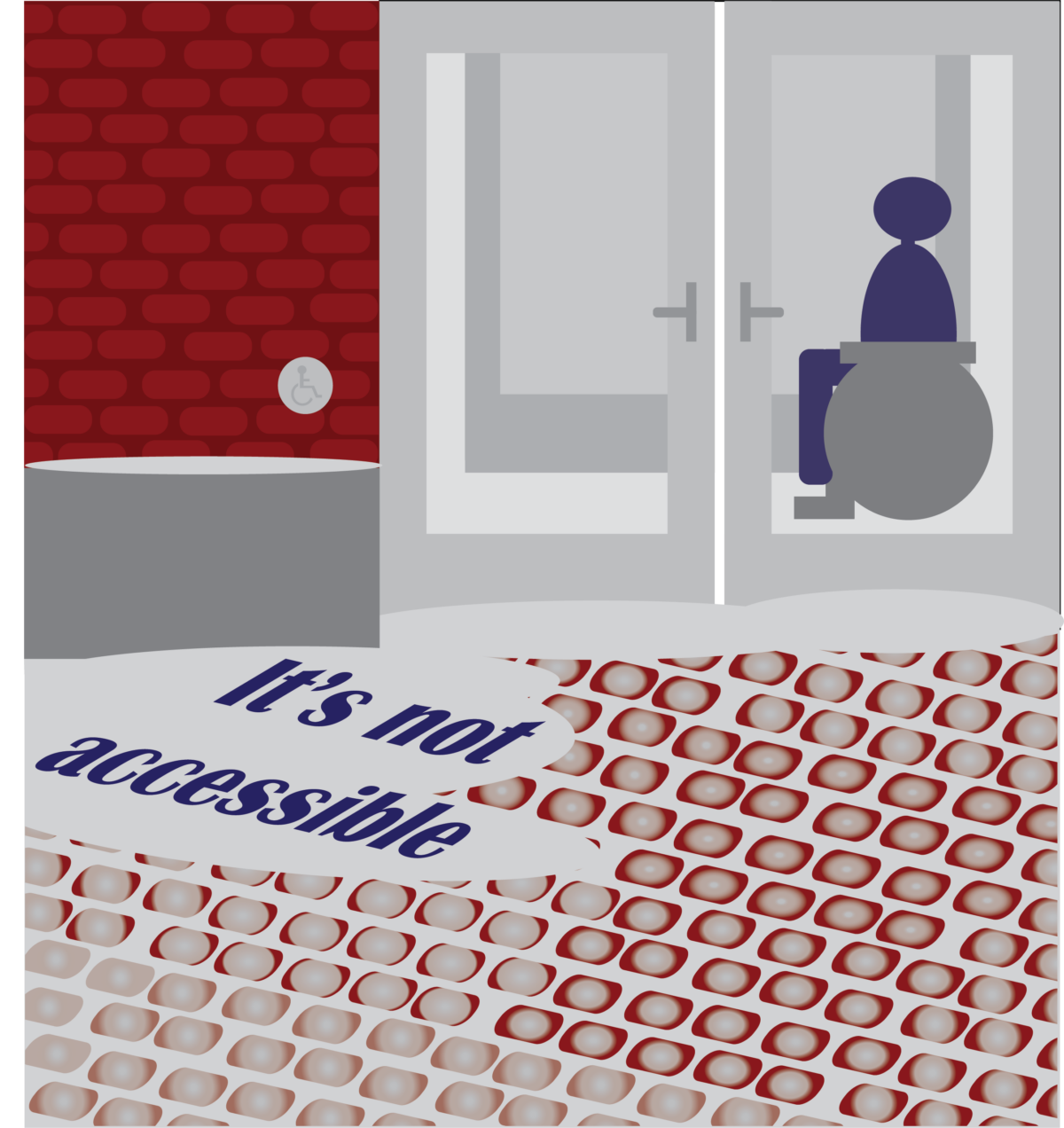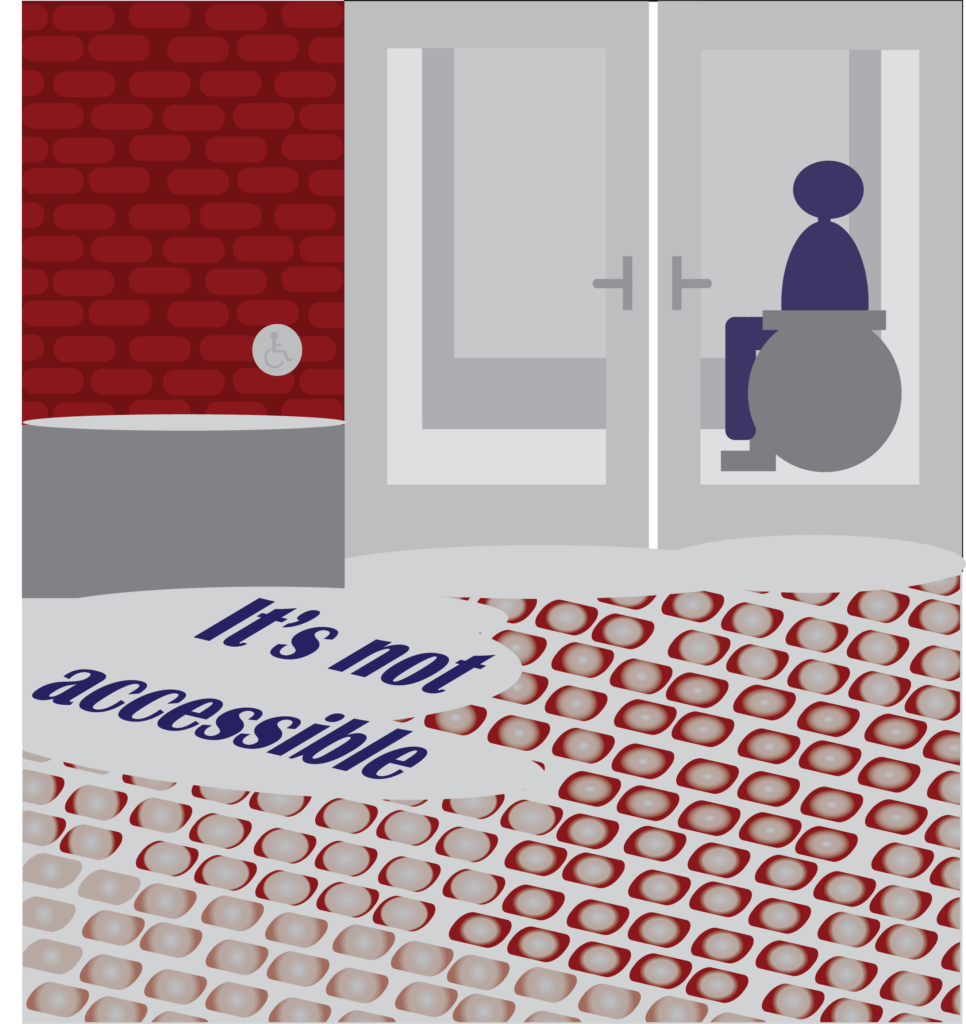

Hazel Bozikowski | Photo and Visual Editor | hbozikowski@mail.smcvt.edu
As I packed a bag to shower at my friend’s house I would have never expected to feel so helpless. My mom and dad had brought me to UVM Medical Center after hearing pops in my knee and collapsing on the sideline at St. Anselm College. While we waited in the hospital, I still had my hair in a ponytail, and my pinnie on from our first lacrosse game. I didn’t want to believe what everyone was thinking, but when I heard the three letters “ACL” come out of the nurse’s mouth, I froze.
That same night after my parents said a teary eyed goodbye, my roommate Bridget helped me gather my shampoo, conditioner, body wash and pjs. I put the straps of my shower bag over my head so it was balancing around my neck, and began crutching over to Townhouse 212, where my best friends live. I was thankful Allida Kelliher’s accessible bathroom was on the first floor. This is where I’d be showering for the next two and a half months. We placed one of the blue school issued chairs in the bathtub along with my shower supplies. As I slowly and carefully crutched into the shower, sat on my chair and turned the nozzle on, feelings of frustration and defeat washed over me.
Everyday tasks had become almost impossible. Getting to class became a workout, making dinner became a two hour ordeal and playing lacrosse was completely out of the picture. As weeks went on, I began to accept things were going to be different, and the only way to get through pre and post op was to take recovery day by day.
This injury opened my eyes and made me empathize with people who have to deal with a disability everyday. Those who always have to shower sitting down, individuals who aren’t able to make
themselves dinner, or will never return to a sport that has shaped their life. Through my ACL rehab, I have regained most of my mobility, but the lack of accessibility in certain parts of
campus for those with more permanent mobility issues has stuck with me.
Sadie Chamberlain , ‘25 a student with cerebral palsy, introduced me to another perspective of mobility through accessibility. “There are certain places where the door openers don’t work, and
when my hands are full it’s extremely frustrating,” said Chamberlain. While being on crutches for two months, this was one of my personal frustrations as well. When I was without my personal assistant and best friend, Emma MacDonald, ‘26, it was embarrassing hobbling in and out of classrooms and buildings trying to maintain my balance.
It was even more frustrating finding out that the reason so many of the door openers are broken is due to students kicking them. “Once we are notified of a door button being broken, it goes to the top of the facilities repair list, so they are back in action as soon as possible,” said Mary Wright, director of Accessibility Services and Academic Support. Flyers have also been created and hung up above handicap buttons to announce, “STOP, DON’T KICK” in hopes of ending the unnecessary breaking of the buttons.
Patrick Standen, instructor of philosophy, made a disturbing observation. “Monday, January 27th, I went around and tested the automated buttons, and all of the ones in St. Edmunds didn’t work,” Standen said. With the current policy in place, this issue should have been resolved immediately. “Checking the buttons should be a mandatory task people tend to do everyday,” Standen said. This requirement would not only ensure that the buttons work for people who need them, but make button repairs more immediate.
One of the most eye opening aspects was the lack of accessibility in the McCarthy Arts Center. “McCarthy is one of the most abelist buildings on campus. There are no railings to get up on stage in the recital hall,” Chamberlain said. A center for the arts is a place for expression, and limiting who can access that building hinders creativity. During Chamberlain’s first theatre audition in the fall of 2021, there were no railings to get onto stage. “I had to crawl on stage, since then there has been a railing put in but still nothing in the recital hall,” Chamberlain said.
Part of the problem is not pre-advocating or pre-installing handicap accessible manufactures, with preconceived thinking surrounding disability our campus can be more ADA compliant. “I wish facilities were more consistent about leaves and snow removal on curbs. It’s pretty frightening and frustrating to call out for help,” Chamberlain said. Going to school in Vermont where snow and ice are common, falling is a constant concern. Even in the rain, I caught myself slipping around on my crutches.
“It is hard to remove all the snow with the plows, they tend to leave around an inch of snow behind, which is dangerous for people with mobility
issues” Standen said. Remaining snow and slush create slippery situations for able bodied people, imagine how difficult it is for someone with a physical
disability.
The Student Success Center has put in place a protocol for registered students with a disability, where paths from their home to Alliot, and the academic buildings are cleared of snow and ice. The Success Center works with facilities to share student schedules, so the workers are aware of what times the paths will be traveled by students, so they can be accessible. Mary Wright, vocalized her welcoming for students’ needs. “If there is an issue, our campus and community is small enough where we can accommodate for specific needs”, Wright said.
While the College has arrangements to help people with mobility issues, more can always be done. “If a class wanted to go on a field trip, there is no accessible van for people in a wheelchair,” Standen said. Small improvements, like having an accessible van for field trips, creates all the difference for the overall representation of St. Michael’s student body.
“It will take a long time to integrate societal change surrounding disabilities, because it means a change in everything from floor plans to language so expecting that to change is not an overnight task,” Chamberlain said. There will always be a need.

